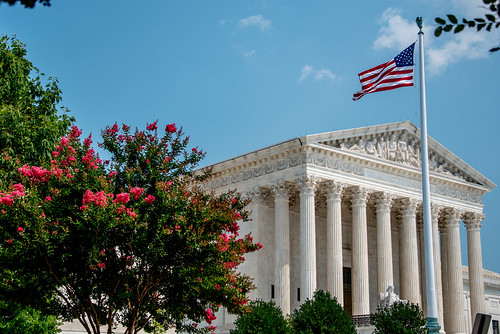Colorado Ran Into A SCOTUS Buzzsaw In Trump DQ Clause Case
SCOTUS #SCOTUS

The Supreme Court cut across partisan lines Thursday to make one concern shared by most of the justices quite clear: They were squeamish about a single state unilaterally disqualifying a candidate for president on the grounds that they engaged in insurrection.
The reticence came from both liberal and conservative justices, as they wrestled with a Colorado Supreme Court decision to remove Donald Trump from the GOP primary ballot for having engaged in insurrection on Jan. 6, thereby disqualifying him from the presidency.
What emerged was a picture of a court poised to allow Trump to remain on the ballot by holding that one state cannot use the 14th Amendment’s Disqualification Clause to bar a federal candidate from the ballot. Virtually missing from nearly the entire two-hour-twenty-minute oral argument was any discussion of the reason that the case landed at the Supreme Court in the first place: whether Trump engaged in insurrection on Jan. 6.
Instead, the court meandered somewhat through the various off-ramps that Trump provided to dismiss the case on jurisdictional grounds: whether the President is an officer of the United States; whether an 1869 case established that Congress needed to pass enforcement legislation in order for Section Three of the 14th Amendment to operate; and, finally, whether allowing the Colorado ruling to stand would create an untenable situation in which each state could determine on its own who appears on the ballot.
That argument largely ignored that each state already has its own process for determining which presidential candidates appear on state ballots. Shannon Stevenson, an attorney representing the Colorado secretary of state, put it succinctly when she had her turn before the justices: The “messiness of federalism,” which results in different states excluding different candidates as a matter of course, is a feature not a bug.
It remained unclear exactly what legal rationale the court would arrive at for why Colorado lacked the power to remove Trump from the GOP ballot. Some of the justices seemed to suggest Congress would need to enact legislation containing an enforcement mechanism while others were still stuck on whether the Disqualification Clause applies to the president.
Chief Justice John Roberts, channeling what seemed like the emerging view of the court, moved the conversation at various points towards the broad question of federal vs. state power. Roberts said he doubted whether Colorado could use the 14th Amendment to disqualify Trump, and suggested at one point that doing so would open a slippery slope in which various state governments disqualified presidential candidates from the opposing party, whittling down the number of states that decide the election to a small few. Roberts asked whether “the whole point of the 14th Amendment was to restrict state power,” before adding that the Colorado voters’ position was “at war with the whole thrust of the 14th Amendment.”
At the start, when Trump attorney Jonathan Mitchell began, most of the justices held their cards closer to the vest. Roberts opened with a question about whether a state could disqualify a candidate who admitted to being an insurrectionist; Justices Brett Kavanauch and Neil Gorsuch didn’t speak for the first 15 minutes; Justice Amy Coney Barrett asked a series of questions which left her view relatively unclear. Mitchell was ready to concede several points throughout: at one point, for example, he agreed it was “odd” that “President Trump would fall through the cracks” if the court agreed with his position that the Disqualification Clause covers all officials except for the president.
In the first half of the arguments, only Justice Samuel Alito homed in on the question of whether states could disqualify federal office holders.
“Is there any history of states using Section 3 as a way to bar federal office holders?” Alito asked.
This alone was unremarkable, as Alito has a penchant for acting as a pseudo-extra attorney for the side he favors.
But when counsel for the Colorado voters, represented by the nonprofit watchdog Citizens for Responsibility and Ethics in Washington (CREW), appeared, things went downhill fast for Colorado as the likely consensus view became clear: States lack the power to determine whether a presidential candidate engaged in insurrection and to thereby disqualify them..
“Do you have contemporaneous examples— and by contemporaneous, I mean shortly after the adoption of the 14th Amendment — where the states disqualified national candidates?” Justice Clarence Thomas asked.
When Murray answered in the negative, adding that ballot qualification worked differently then, Thomas sounded skeptical.
“There were a plethora of confederates still around, there were any number of people who would continue to either run for state office or national offices,” he responded. “That would at least suggest that there would at least be a few examples of national candidates being disqualified, if your reading is correct.”
Barrett, tugging on the same thread, put it more simply: “It just doesn’t seem like a state call.”
At another point, Roberts asked Murray whether a decision affirming Colorado would open the doors to disqualification cases around the country.
“We haven’t seen anything like Jan. 6 since Reconstruction,” Murray replied.